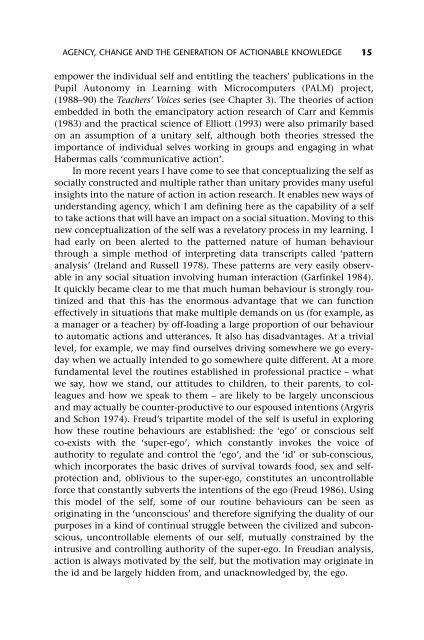Action Research A Methodology for Change and Development
Action Research A Methodology for Change and Development
Action Research A Methodology for Change and Development
Create successful ePaper yourself
Turn your PDF publications into a flip-book with our unique Google optimized e-Paper software.
AGENCY, CHANGE AND THE GENERATION OF ACTIONABLE KNOWLEDGE 15<br />
empower the individual self <strong>and</strong> entitling the teachers’ publications in the<br />
Pupil Autonomy in Learning with Microcomputers (PALM) project,<br />
(1988–90) the Teachers’ Voices series (see Chapter 3). The theories of action<br />
embedded in both the emancipatory action research of Carr <strong>and</strong> Kemmis<br />
(1983) <strong>and</strong> the practical science of Elliott (1993) were also primarily based<br />
on an assumption of a unitary self, although both theories stressed the<br />
importance of individual selves working in groups <strong>and</strong> engaging in what<br />
Habermas calls ‘communicative action’.<br />
In more recent years I have come to see that conceptualizing the self as<br />
socially constructed <strong>and</strong> multiple rather than unitary provides many useful<br />
insights into the nature of action in action research. It enables new ways of<br />
underst<strong>and</strong>ing agency, which I am defining here as the capability of a self<br />
to take actions that will have an impact on a social situation. Moving to this<br />
new conceptualization of the self was a revelatory process in my learning. I<br />
had early on been alerted to the patterned nature of human behaviour<br />
through a simple method of interpreting data transcripts called ‘pattern<br />
analysis’ (Irel<strong>and</strong> <strong>and</strong> Russell 1978). These patterns are very easily observable<br />
in any social situation involving human interaction (Garfinkel 1984).<br />
It quickly became clear to me that much human behaviour is strongly routinized<br />
<strong>and</strong> that this has the enormous advantage that we can function<br />
effectively in situations that make multiple dem<strong>and</strong>s on us (<strong>for</strong> example, as<br />
a manager or a teacher) by off-loading a large proportion of our behaviour<br />
to automatic actions <strong>and</strong> utterances. It also has disadvantages. At a trivial<br />
level, <strong>for</strong> example, we may find ourselves driving somewhere we go everyday<br />
when we actually intended to go somewhere quite different. At a more<br />
fundamental level the routines established in professional practice – what<br />
we say, how we st<strong>and</strong>, our attitudes to children, to their parents, to colleagues<br />
<strong>and</strong> how we speak to them – are likely to be largely unconscious<br />
<strong>and</strong> may actually be counter-productive to our espoused intentions (Argyris<br />
<strong>and</strong> Schon 1974). Freud’s tripartite model of the self is useful in exploring<br />
how these routine behaviours are established: the ‘ego’ or conscious self<br />
co-exists with the ‘super-ego’, which constantly invokes the voice of<br />
authority to regulate <strong>and</strong> control the ‘ego’, <strong>and</strong> the ‘id’ or sub-conscious,<br />
which incorporates the basic drives of survival towards food, sex <strong>and</strong> selfprotection<br />
<strong>and</strong>, oblivious to the super-ego, constitutes an uncontrollable<br />
<strong>for</strong>ce that constantly subverts the intentions of the ego (Freud 1986). Using<br />
this model of the self, some of our routine behaviours can be seen as<br />
originating in the ‘unconscious’ <strong>and</strong> there<strong>for</strong>e signifying the duality of our<br />
purposes in a kind of continual struggle between the civilized <strong>and</strong> subconscious,<br />
uncontrollable elements of our self, mutually constrained by the<br />
intrusive <strong>and</strong> controlling authority of the super-ego. In Freudian analysis,<br />
action is always motivated by the self, but the motivation may originate in<br />
the id <strong>and</strong> be largely hidden from, <strong>and</strong> unacknowledged by, the ego.

















